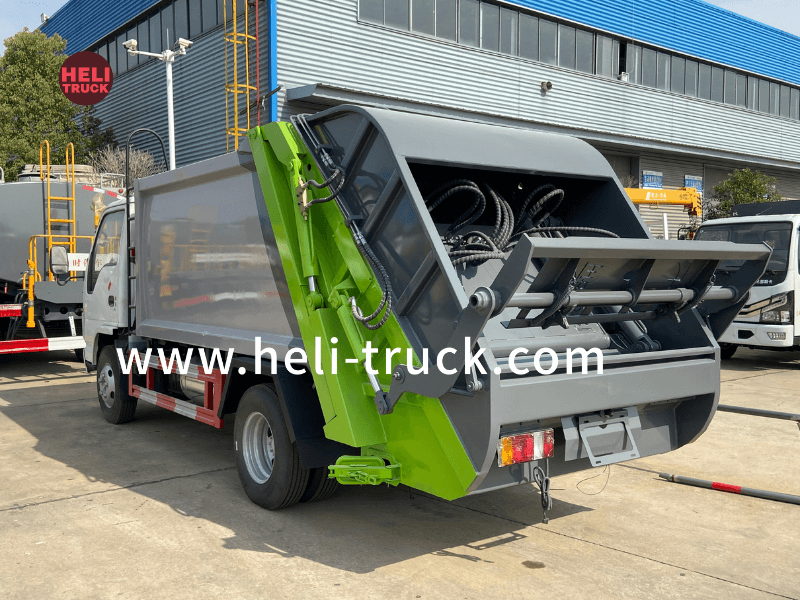Introduction
Waste management is a critical issue that affects communities around the world. With the ever-increasing population and urbanization, the amount of waste generated has also been on the rise. Proper waste management is essential to protect the environment, public health, and natural resources. Garbage compactor trucks have emerged as a vital tool in waste processing, revolutionizing the way we handle and dispose of waste. This article will delve into the importance of garbage compactor trucks in waste management, their functionality, benefits, and the future of waste processing.
The Need for Efficient Waste Management
The rapid growth of urban areas has led to an increase in waste generation. Improper waste management can have detrimental effects on the environment, such as pollution of land, water, and air. It can also pose health risks to the population, as untreated waste can harbor harmful pathogens and contaminants. Inefficient waste management can result in unsightly and unhygienic conditions, leading to a decline in the quality of life for residents.
To address these challenges, there is a pressing need for efficient waste management systems that can handle the growing volume of waste produced daily. Garbage compactor trucks play a crucial role in this process by collecting, compacting, and transporting waste to designated disposal sites.

Functionality of Garbage Compactor Trucks
Garbage compactor trucks, also known as waste compactors or refuse trucks, are specially designed vehicles equipped with compacting mechanisms that compress waste materials to reduce their volume. These trucks come in various sizes and configurations to cater to different types of waste collection needs, ranging from residential to commercial and industrial settings.
The basic functionality of a garbage compactor truck involves several key components:
1. Collection: Garbage compactor trucks are used to collect solid waste from various sources, such as households, businesses, and public areas. The waste is loaded into the truck through a rear-loading or side-loading mechanism, depending on the design of the vehicle.
2. Truck mounted crane boom length : Once the waste is loaded into the truck, it undergoes a compaction process where a hydraulically powered compactor compresses the waste to reduce its volume. This compaction process allows the truck to carry a larger quantity of waste before needing to unload it.
3. Transportation: After compaction, the garbage compactor truck transports the waste to a designated disposal site, such as a landfill or recycling facility. The compacted waste is securely contained within the truck to prevent spillage during transit.
4. Disposal: Upon reaching the disposal site, the waste is unloaded from the garbage compactor truck and deposited into designated areas for further processing or disposal. Some waste management facilities may also have on-site compactors to further compress the waste before final disposal.
Benefits of Garbage Compactor Trucks
Garbage compactor trucks offer several benefits that make them indispensable in waste management systems:
1. Increased Efficiency: The compaction mechanism of garbage compactor trucks allows for the efficient handling of a large volume of waste. By compressing the waste, these trucks can make fewer trips to disposal sites, saving time and resources.
2. Improved Hygiene: Garbage compactor trucks help maintain cleanliness and hygiene in urban areas by containing and compacting waste securely. This reduces the risk of littering, odors, and the spread of diseases associated with unmanaged waste.
3. Cost-Effectiveness: Investing in garbage compactor trucks can result in long-term cost savings for municipalities and waste management companies. The increased efficiency and capacity of these trucks can lead to lower operational costs and reduced fuel consumption.
4. Environmental Benefits: By reducing the volume of waste through compaction, garbage compactor trucks help minimize the space needed for landfill disposal. This can extend the lifespan of existing landfills and reduce the environmental impact of waste disposal.
5. Versatility: Garbage compactor trucks come in various sizes and configurations to accommodate different waste collection needs. They can be used for residential, commercial, and industrial waste collection, making them versatile tools in waste management.
Future Trends in Waste Processing
As technology continues to advance, the waste management industry is evolving to adopt innovative solutions for more sustainable waste processing. Some emerging trends in waste processing include:
1. Smart Waste Management: The integration of sensors, IoT (Internet of Things) technology, and data analytics in waste management systems is enabling real-time monitoring of waste collection, bin levels, and truck routes. This data-driven approach allows for optimized route planning, resource allocation, and predictive maintenance of garbage compactor trucks.
2. Waste-to-Energy Conversion: Waste-to-energy technologies are gaining traction as a means to convert waste into renewable energy sources, such as biogas, biofuels, and electricity. Garbage compactor trucks can play a role in collecting organic waste for processing in anaerobic digesters or waste-to-energy plants.
3. Circular Economy Practices: The concept of a circular economy aims to minimize waste generation and maximize resource efficiency through recycling, reuse, and recovery of materials. Garbage compactor trucks can facilitate the collection and transportation of recyclable materials to recycling facilities, supporting the transition to a circular economy model.
4. Zero Waste Initiatives: Zero waste initiatives promote the diversion of waste from landfills through composting, recycling, and waste reduction strategies. Garbage compactor trucks can support these initiatives by facilitating the collection and separation of different waste streams for proper disposal or recycling.
Conclusion
Garbage compactor trucks play a vital role in waste management systems by collecting, compacting, and transporting waste efficiently. These specialized vehicles help maintain cleanliness, hygiene, and environmental sustainability in urban areas by reducing the volume of waste and optimizing waste processing operations. As waste management practices evolve to embrace technology and sustainability, garbage compactor trucks will continue to be at the forefront of innovative waste processing solutions. By investing in these essential tools and embracing emerging trends in waste management, communities can work towards a cleaner, greener future for generations to come.
